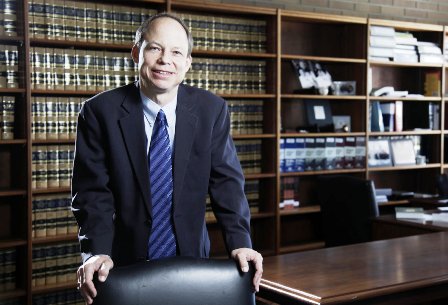Recent News
The difficulties of a judicial recall
 An illustration of blind justice. (Image: Sebra, via Shutterstock)
An illustration of blind justice. (Image: Sebra, via Shutterstock)A day after Judge Aaron Persky, of California Superior Court, sentenced a Stanford University athlete to six months in jail on a sexual assault conviction, calls for his ouster grew deafening.
Prosecutors had recommended that the defendant, Brock Turner, a star swimmer, be sentenced to six years in state prison, and public sympathy for the victim was running high, especially after she delivered an impassioned 7,000-word statement in the courtroom and online.

Brock Allen Turner.(Photo: Santa Clara County Sheriff)
After the sentencing last Thursday, hundreds of thousands of people became outraged, and social media lit up with calls — including one by a Stanford law professor — that the judge be recalled by popular vote. By Tuesday afternoon, a Change.org petition in support of that recall had accumulated over 415,000 signatures.
Yet recalling a sitting judge is almost unheard of, both in California and nationally. Nineteen states and Washington, D.C., allow the recall of state officials, but only eight allow it for judges — because the judicial branch is traditionally seen as deserving protection from popular whim, political pressure, or, as in this case, the increasing influence of social media.
“Recall is much, much more common for local and municipal officials, like school board officials and city council members,” said William Raftery, a senior analyst for the National Center for State Courts. “Judges are only supposed to face recall, if at all, when they’ve committed a crime while in office or are deemed physically or mentally incompetent to actually do their job.”
Indeed, of the states that allow judges to be recalled, most have statutes stipulating that it can only happen if the judge has committed some act of malfeasance — taking bribes, drunkenness in court, etc. — or nonfeasance — skipping hearings, struggling in old age to keep up.
The discretionary performance of a prescribed duty, like Judge Persky’s decision in the Turner case, is rarely grounds for a recall.
In California, the process for attempting to recall a state official is somewhat easier, though still uncommon. Unlike other states, where reasons for recall are evaluated for merit, California’s only requirement for a successful petition is that it follow a certain format and have enough signatures (calculated as a percentage of the number of voters in the last election). As a result, since 1913 the state has seen 49 attempts to recall governors and 27 attempts to recall Supreme Court justices. Those include former Gov. Gray Davis, who was famously recalled in 2003 and succeeded by Arnold Schwarzenegger.
But even in California, less prominent judges (essentially, all those not on the State Supreme Court) do not appear to face recall often. A review of local news accounts shows hardly any recall attempts of local judges in the past several years. Because these records are kept by court clerks in individual counties, statewide statistics are not available.
In one of the few attempted recalls of a superior court judge like Persky, the people of Orange County attempted to recall Judge Nancy Wieben Stock for granting O.J. Simpson custody of two of his children. The bid was unsuccessful.
Another recall attempt came just last year, in a case that bore some key similarities — and some key differences — with the sentencing of Brock Turner.
After a jury convicted Kevin Rojano-Nieto of sodomizing a three-year-old child, Judge M. Marc Kelly sentenced him to 10 years in prison — rather than the statutory minimum of 25 years to life. Much as Judge Persky held in the Turner case, Judge Kelly contended that the crime was brief and impulsive, that Rojano-Nieto did not pose a long-term threat, and that a longer sentence would be “grossly disproportionate to the defendant’s individual culpability.”

Santa Clara County Superior Court Judge Aaron Persky in 2011. (Photo: Jason Doiy/The Recorder via AP)
And as in the Turner case, the judge almost immediately faced a national uproar. A Change.org petition gathered almost 85,000 signatures, calling Judge Kelly “reprehensible” for “showing empathy with the rapist” — who in this case was not an elite, white Stanford athlete but a 20-year-old Hispanic man with what Judge Kelly called a “dysfunctional” upbringing.
Judge Kelly soon fought back, writing in a statement that “this petition is an attack on judicial independence.” The Los Angeles Times, in an editorial, argued that “the essence of the American justice system is that rulings are made by judges who are shielded from the heat of public emotion.”
After failing to collect the minimum number of valid signatures, the petition failed.
The arguments on either side of the attempt to recall Judge Kelly may soon be echoed in the uproar over Judge Persky’s handling of the Turner case. On the one side, social media users and advocates against campus rape have argued that in a time of great distrust of the criminal justice system — and of elected officials generally — the public should have more direct ways of holding its elected representatives accountable.
But opponents of recalling judges say that there can be such a thing as an excess of democracy, especially when it comes to the judicial branch.
As the Brennan Center for Justice has reported, attacks on judges for issuing “lenient sentences” and “failing to protect women and children” have the longer-term effect of making judges more likely to rule against innocent defendants and more likely to affirm death sentences.
“This heightened political temperature,” wrote Alicia Bannon, an expert on judicial elections and recall, in a recent Brennan Center report, “risks exacerbating pressures to decide cases based on political…expediency, rather than on their understanding of the law.”
—
Ed’s Note: This article was originally published by The Marshall Project, a nonprofit news organization that covers the U.S. criminal justice system. Sign up for their newsletter, or follow The Marshall Project on Facebook or Twitter. This story appeared on June 7.
Want to see more stories like this? Sign up for The Roundup, the free daily newsletter about California politics from the editors of Capitol Weekly. Stay up to date on the news you need to know.
Sign up below, then look for a confirmation email in your inbox.

The one thing this is missing is that, much like Peter Thiel’s use of the judicial system in an unrelated case to take down Gawker, this will be a test run for how to bounce a judge for a future trial. With so many Silicon Valley companies still run by charismatic founders rather than dispassionate boards of directors, imagine if a judge who ruled negatively against, say, Oracle would be under the threat of being recalled if they upheld a 8 or 9 figure judgment. Recalling them for some unfair ruling, or even forcing an election, would cause enough of a threat for judges to think twice. I would not be surprised if a few million in dark money starts pouring in signature gathering to see what the going rate is to recall a judge.
There is another way to remove a dubious judge–ie the same way a more infamous
Officer of the Court-is in que to be removed–and sentenced to prison–ie she that
was so roundly rebuked by a Bi Partisan US 9th Circuit Court-that it all but suggested
she( CA AG KAMALA HARRIS) resign due to the EPIDEMIC OF CORRUPTION she
had engendered.
That rebuke was–before–before the 9th Circuit was aware of:
l.Harris hiring,as personal aides—LARRY/CURLY AND MOE–former Knights Templar Brigade clowns–two of which were subsequently arrested for impersonating Police
Officers— a F E L O N Y
2. Harris’s CRIMINAL COMPLICITY –in a CRIMINAL RUSE TO GIFT $300,OOO
of State Tidelands Funds—with Robert Garcia of Long Beach-who she flew
to Long Beach to swear in as SITTING MAYOR..after which the dubious duo cut
more than a rug—manifested by QUID PRO QUO-(Same type of conduct that
led to the well justified REBUKE OF THE US 9TH Circuit)..ie for NOT prosecuting
the PIP SQUEAK GARCIA (In spite of the uncontroverted evidence of his guilt-
he(Garcia) would support the REBUKED HARRIS’S -far from dry dream to
become US Senator.!!!!
As a side note—even if the complicit duo’s number does not come up in the
FBI/USDJ cue—-before November—-the now NATIONAL SCRUTINY BY
NATIONAL PRESS of a US SENATE RACE—with those wanting a uncorrupt
US SENATOR–ie–those supporting US REP Sara Sanchez -will HOLD THE
SPOTLIGHT ON THE CORRUPTION the REBUKED HARRIS continues to
engender. (Check LA Times..1/31/15-2/1/15.